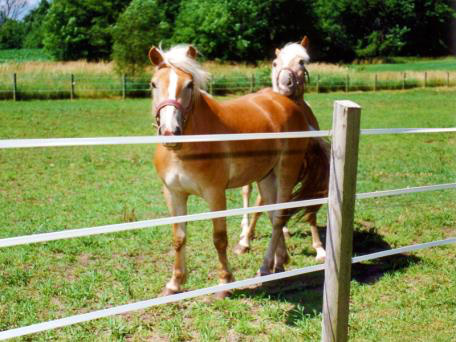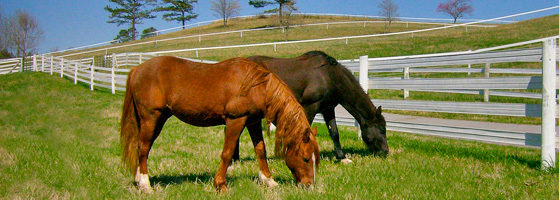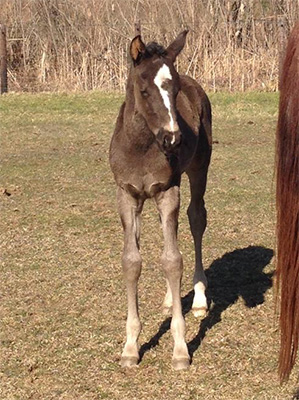 |
 |
|
Nutrition Tips for Stallions and Broodmares
 |
All horses need the proper balance of vitamins and minerals, but for breeding stock, nutrition is a critical component to producing strong and healthy foals.
Article written by Karen Elizabeth Baril
Breeding Stallions
The first thing you’ll want to do before making any nutrition changes is to assess your stallion’s current body condition. Using the
Henneke Body Condition Scoring System, your stallion should score somewhere between a six or seven, or slightly higher than
normal to be sure he doesn’t get too thin during the breeding season. He should have enough fat to cover his rib. Ribs should not be
visible. His withers should be rounded and his shoulder and neck should blend smoothly into his body.
Protein
On average, the breeding stallion requires 40 grams of crude protein per mega calorie of digestible energy. Avoid feeding too much
protein---not only is this wasteful, but the extra protein will be excreted in the urine, contributing to a foul smell in the barn and the
risk of decreased renal function. Your stallion’s total daily feed consumption should total 1.5% and 2.5% of his body weight per day.
Vitamins and Minerals
A properly formulated stallion feed will have a balanced calcium to phosphorous ratio.
There is no evidence to support that extra Vitamin A or E supports stallion fertility, but we do know that Vitamin E is the primary
antioxidant in seminal cell membranes and acts as a major protectant against oxidative stress.
Fats-DHA-Omega 3’s
There are two common lipids found in semen--- docosahexaenoic acid (DHA---an Omega 3 fatty acid) and docosapentaenoic acid
(DPA- an Omega 6 fatty acid). A recent study at Texas A&M University’s Department of Animal Sciences showed that
supplementing stallions with omega 3 fatty acids has numerous benefits. The study showed that omega 3’s increase the number of
sperm per ejaculate, increase the motility of sperm, and decrease dead and abnormal sperm. DHA is found in stabilized rice bran,
flax seed, and stabilized fish oil. Your veterinarian or equine nutritionist can recommend a quality supplement.
Energy
Think of your stallion as a performance horse, but keep in mind that just like a performance horse, his energy needs vary depending
on his breed, his metabolism, his exercise program, and how active he is in the breeding shed.
Broodmares
Mares should enter the breeding season with a BCS (body condition score) of at least five, preferably six. Veterinarians warn,
however, about the dangers of too high a score. Obese mares can have trouble in the breeding shed.
If your mare has spent the winter outside and is on the thin side, keep in mind that most mares tend to lose weight during lactation.
Your mare should start with a body condition score above five or above. A surplus of fat stores can buffer nutritional demands in late gestation and early lactation.
After foaling total feed consumption should increase. Some lactating mares can eat between 2.5 to 3.lbs. of total feed (forage and
concentrates) per 100lb. of body weight. The actual amount will vary. For example, some mares produce a lot of milk, others
produce less. The higher the milk production the higher the nutritional needs of the mare.
Vitamins and Minerals
A pregnant mare must consume enough calcium to meet her needs as well of those of the developing fetus. Pregnant and lactating animals will mobilize calcium from their own bones if the diet is lacking.
Keep in mind that many forages do not provide enough copper for pregnant mares, particularly in late gestation. Pregnant mares may
not need a lot of concentrates, but they almost always need some type of supplement that provides major and trace minerals in adequate amounts.
 |
Forage
In one study at the University of Kentucky, Thoroughbred mares in mid to late gestation were able to maintain weight and fulfill their
protein requirements on forage alone. The mares were fed high quality alfalfa hay. If you’ve got an easy keeper, consult your vet before adding concentrates—you may only need to add a supplement.
A mare getting early maturity grass legume mix hay will usually need fewer pounds of concentrate than a mare getting late maturity
grass hay. Do not feed tall fescue which can be infected with an endophyte that produces compounds that affect pregnant mares.
Common signs of tall fescue toxicosis include lack of udder development and milk production, abnormal placentas, and even dystocia (obstructed labor) and foal morbidity.
Foals; from Birth to Weaning.
 When it comes to feeding the youngsters, think balance. It’s almost impossible
for a foal to obtain all the nutrients he needs from dry forage alone. When it comes to feeding the youngsters, think balance. It’s almost impossible
for a foal to obtain all the nutrients he needs from dry forage alone.
A common observation of foals kept mostly on pasture is slow growth in winter
followed by rapid growth in spring when pasture increases and weather becomes mild. But, those kinds of uneven growth rates put the foal at risk for
developmental orthopedic diseases. Achieve a moderate, even paced growth through feeding good quality forage and a concentrate designed for your youngster’s growth stage.
Keep in mind that as early as 10 weeks of age, mare’s milk alone may not be enough to meet your foal’s nutritional needs. Always consult your veterinarian or
equine nutritionist on when to add concentrates. Use a weight tape to help you estimate your foal’s growth and re-assess weekly. If you do feed concentrates be
sure to divide rations into three or four small feedings and feed each foal separately.
Water, of course, is critical. Be sure all your breeding stock has a constant supply of fresh, clean water. Automatic hydrants and waterers in the pasture are a good investment in any breeding program.
There are several factors involved in a good breeding program, including genetics, environment, and nutrition. Perhaps the most
important take home message is to strive for balance. A balanced ration of good quality hay, grain, and supplements is the key to any successful breeding operation.
|
 |
 |
|
To advertise your horse product or service, Contact Ann
|
 |
 |
|
InfoHorse.com, Horse Information Lives Here ®
2/23/2026
Contact Us to Advertise to over a million Horse Owners.
All images and content Copyright© 2022 by InfoHorse.com,
|
 |
 |
|
Articles, Academic Schools, Arena Maintenance, Animal Communicators, Barns, Barn and Accessories, Barn Equipment and Tractors, Breast Collars, Grooming Products for Horses, Hay Feeders, Horse Blankets, Horse Breeders, Horse Camping Gear, Career Schools, Horse Training Clinicians, Equestrian Clothing, Dogs and Puppies, Horse Fencing, Horse Products For Sale, Fly Control, Foal Care, Horse Footings, Horse Gifts, Horse Health and Nutrition, Hoof and Leg, Horse Insurance, Certified Trainers, Equine Lawyers, Leather Care, Links , Portable Horse Stalls, Arenas and Roundpens, Horse Riding Schools, Horse Schools, Safety Products, Services for Horses, Horse Trailers, Horse Shipping, Horse
Skin Coat Care, Specialty Trainers, Horse Summer Camps, Tack, Horse Trainers, Treats and Snacks, Truck Accessories, Trucks, Horse Vacations, Western Lifestyle
|
|